With more than 2500 non-State actors registered, Civil Society Organisations (CSOs) are a crucial part of the High Level Political Forum (HLPF). They contribute ideas, reflections, experience, inspiration – and sometimes criticism – making HLPF into a varied and dynamic event.
Transparency, accountability, measurement, monitoring, reporting, implementation, involvement, engagement, contribution, responsibility, accessibility, ownership: just a few of the keywords that have characterised CSO participation so far in New York this year.
But it is the concept of ‘participation’ itself that will be the focus of this blog. Because the possibility for non-State actors to engage and make their voices heard is not a given.
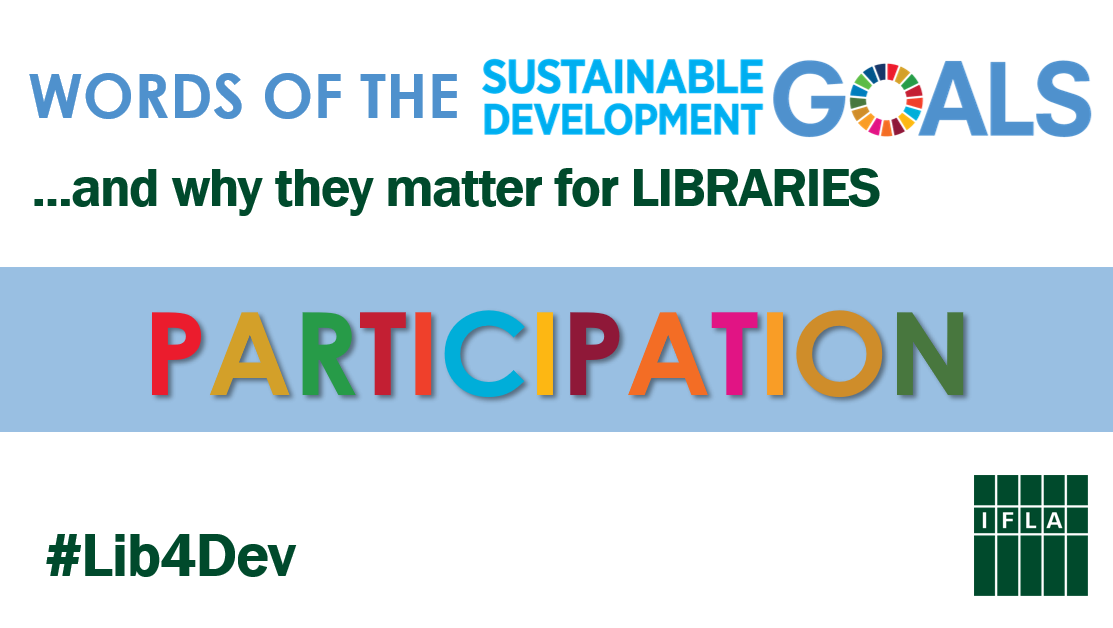
The 2030 Agenda itself underlines the importance of participation, and across sessions and side events at HLPF 2018, this idea continues to be high on the agenda. Three perspectives in particular have been discussed in relation to civil society participation: the country level, the regional level, and the international level.
A reflexion on the participation of CSOs at each of these levels follows:
Participation at the Country Level
One big question is: To what extent CSOs are involved at a national level?
Have they been invited to participate in commissions or workshops to discuss monitoring or implementation? How has this participation been formalised? Have CSOs been invited to give input or review documents and provide comments? Were these comments incorporated or considered at all? How about marginalised or most vulnerable groups? Is there an outreach strategy or mechanism in place by the government?
In the first week of the HLPF, we’ve heard and seen it all. There are cases of countries involving stakeholders to reach a consensus from the word ‘go’. This is the ideal situation! In some countries governments have taken comments from CSOs, but only incorporated them partially into their planning and reporting. Nonetheless, this is also a good advance. However, in other cases CSOs really want to voice their concerns or ideas, but they find no proper mechanism to give feedback.
Awareness is a big issue. How can you participate if you don’t know what is going on? How aware are CSO stakeholders of the actions taken by government in relation to the SDGs? How aware is the government about their responsibilities to achieve the SDGs? More efforts are needed to raise awareness across the board.
One of the challenges faced by CSOs is the lack of information on who is really in charge of SDG planning and implementation. With fragmented governance of delivering the 2030 Agenda in many cases, it is very hard to find the right people, and this gets even harder when administrations change or after elections have taken place. Even official HLPF country pages are somewhat incomplete or outdated. This can mean a lot of time spent and lost opportunities for CSOs.
Considering the multiplicity of topics in the 2030 Agenda, having a national coordinating body, usually at the highest level in the government organisational structure, and assigning focal points from all ministries and specialised agencies to be part of a steering committee for planning and reporting is considered a good practice.
Multi-stakeholder commissions, across all areas and involving crosscutting issues, are definitely a good way forward. A space for dialogue between government, private sector, academia, and civil society is key, but this needs to have an impact on public policy to be truly worthwhile.
In some cases, CSOs have presented reports, sometimes called “shadow reports”. These reports can have several approaches: they can point out what is missing, they can use the same data and do another interpretation, or they can provide new evidence. But interrogations remain about these: How to ensure that CSOs are considered partners in monitoring progress? What should these reports look like? How and where should they be submitted for consideration?
Those countries that have placed the SDGs in the legal framework or have ensured that access to information laws that are enforced, have an advantage. But unfortunately, it’s not that common. Informal engagements are usually well received and there are relatively positive efforts to open processes. However, the lack of methodology or an established process makes it harder to become a reality.
Since CSO involvement is recommended but not mandatory for Voluntary National Reviews (VNRs), the situation varies a lot from country to country. Some countries are really struggling to find the right process or methodology. In some cases, they have open mechanisms, with key stakeholders involved and included in validation stages. In others participation is ad hoc, and only small groups are consulted, often on an arbitrary basis.
Bringing less frequently heard voices to the mainstreaming process is key in the hopes of leaving no one behind. Still it is mostly well organised and well-funded NGOs that are the ones at the table. Even within CSOs some take the leadership and it is very hard for small ones or those outside of the mainstream to convey their messages.
CSOs coalitions are a possible solution to secure civil society participation. Since space for participation is shrinking in some countries, given the political climate, consensus and group representation through creating coalitions sounds like a good way to go.
Participation at the Regional Level
This year, preparatory meetings took place in 5 regions before the HLPF for: Europe (ECE), Arab countries (ESCWA), Asia-Pacific (ESCAP), Africa (ECA) and Latin America and the Caribbean (ECLAC).
These meetings have been a good opportunity for civil society to participate, get to know each other and foster collaboration in preparation for the HLPF, particularly through side events and the creation of Civil Society Declarations and, the much needed, CSO Participation Mechanisms.
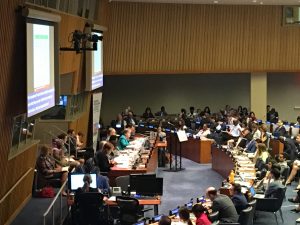
Session: “Thematic review: Implementing the SDGs: lessons from the regions”
As mentioned during the session “Thematic review: Implementing the SDGs: lessons from the regions” the regional and sub-regional levels are recognised as a good environment for discussion and peer-learning, with more space for dialogue than the international level. However, even though there is a mechanism for CSOs to engage at different moments during these fora, the inputs are usually missing in the Ministerial declarations.
As indicated by the NGO Major Group, the regional forums need to be a space to monitor progress, and there should be more space for thematic discussions in the regional level, since the HLPF has proven to be not enough.
Participation at the International Level
The High Level Political Forum (HLFP) is undoubtedly a unique event for countries to present on their progress to a global audience, to learn from other members states from all regions, as well as to interact with government, UN officials and civil society. However, there is a certain level of shared criticism about the level and modalities of participation across the board.
Particularly for CSOs, opportunities for participation on an equal basis with governments are still scarce. As a new development, some countries are bringing CSO representatives to present along with governments, at the VNRs, notably Switzerland and Latvia. However, time for presentations is very limited (1-2 minutes) and it is very hard to send the message of so many stakeholders across in such little time.
Even though CSO have limited opportunities to take the floor and formally interact with their countries during the HLPF, according to a survey prepared by the UN Foundation on the HLPF, some member states surprisingly perceive that CSO has too much space at these fora. This shows how important perceptions are, how these can affect reality.
In addition to this, there is the problem of capacity, funding and language barriers, that make participation at the international level a challenge for most CSOs. Mostly international NGOs are seen at these forums, instead of national or local organisations.
For this, it is very important that international CSOs engage with the local and national levels to bring in their perspectives (particularly in countries where the UN doesn’t have local offices), work with them and give them a voice. A positive added benefit of participating of the HLPF is that there are many opportunities to meet national representatives. In some cases, meeting a representative at the HLPF helps in getting a better response back in the country too.
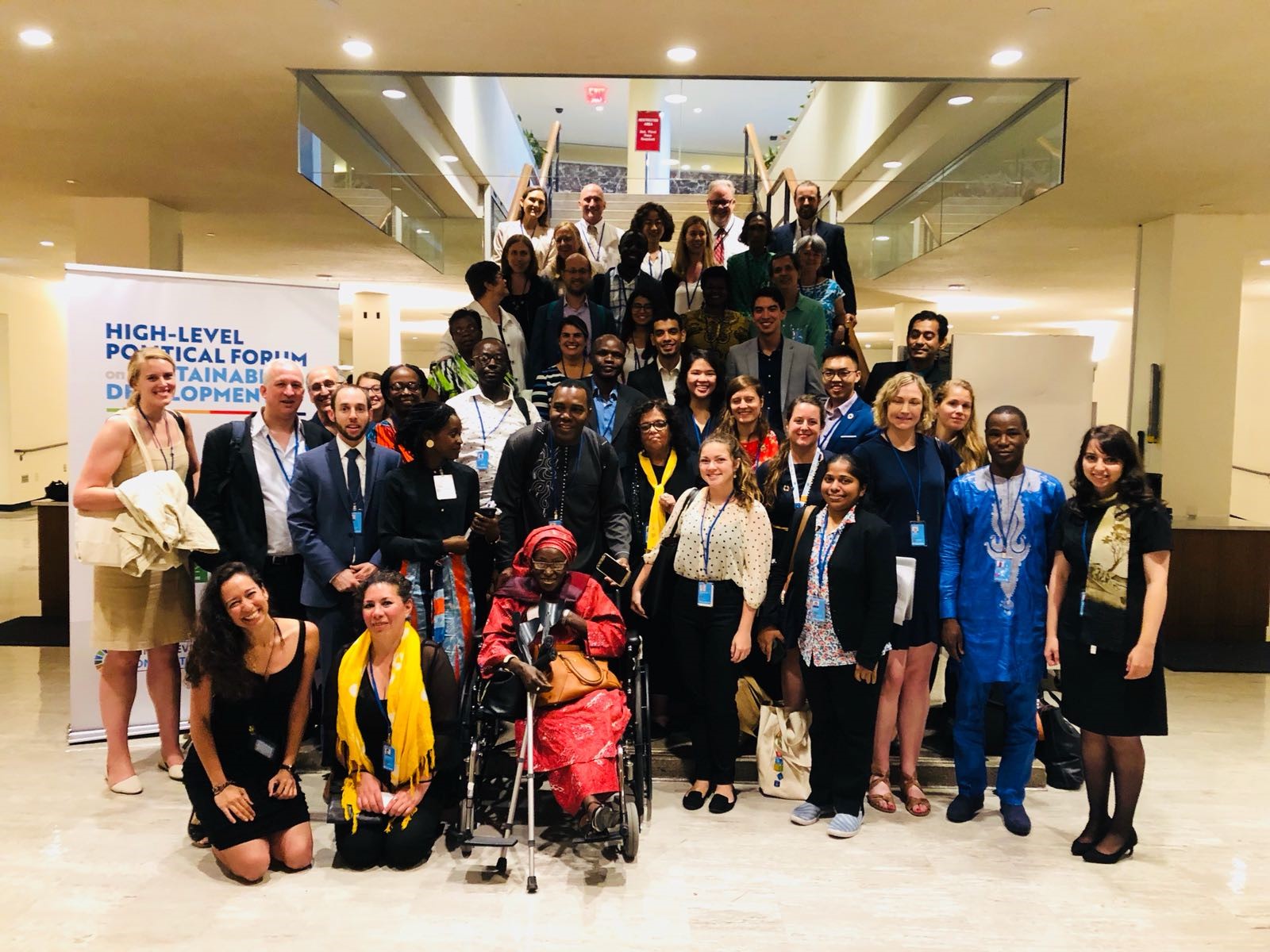
Side event: “An NGO Toolbox to Enhance Implementation of the 2030 Agenda: Towards Sustainable and Resilient Communities” (Photo of the NGO Major Group)
Conclusion and Next Steps
The good news is that there have been improvements, and the fact that there are complaints of the lack of space is a good signal that shows a great interest in the process, from all actors.
The reality is experience of enabling the participation of CSOs is still limited, and it is evident that governments, the UN and CSOs are learning as they go. It is good to know that 2019 will bring a formal opportunity to review the modalities and devise other methodologies.
Learning from the first 4 years of HLPF experience in order to find better ways towards SDG implementation is key. A more operational approach, a bigger space for sharing best practices and recommendations, and a stronger commitment and follow up are some of the improvements people are looking for in this next stage.
For CSOs, the most valuable change would be to foster better discussions and open dialogue with governments. The effective recognition of the multi-stakeholder principle at the country, regional, and international levels is imperative.
One thing is clear, the 2030 Agenda cannot be achieved without civil society. An open and inclusive approach is the only way to go.
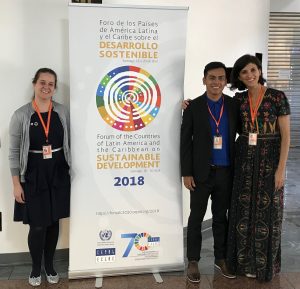 After taking active part in
After taking active part in 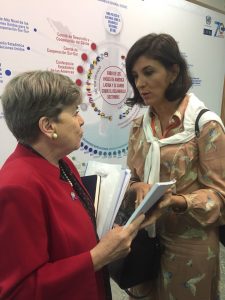 Adriana Cybele Ferrari (FEBAB President, Brazil and IFLA IAP participant) approached ECLAC’s Executive Secretary and delivered a copy of the
Adriana Cybele Ferrari (FEBAB President, Brazil and IFLA IAP participant) approached ECLAC’s Executive Secretary and delivered a copy of the 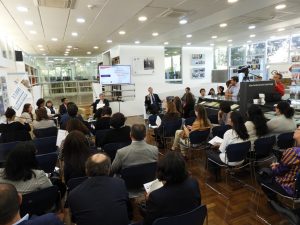 19 April was an extremely successful day for our IFLA delegation, with two main highlights: the side event hosted by ECLAC’s Hernán Santa Cruz Library in partnership with IFLA: “
19 April was an extremely successful day for our IFLA delegation, with two main highlights: the side event hosted by ECLAC’s Hernán Santa Cruz Library in partnership with IFLA: “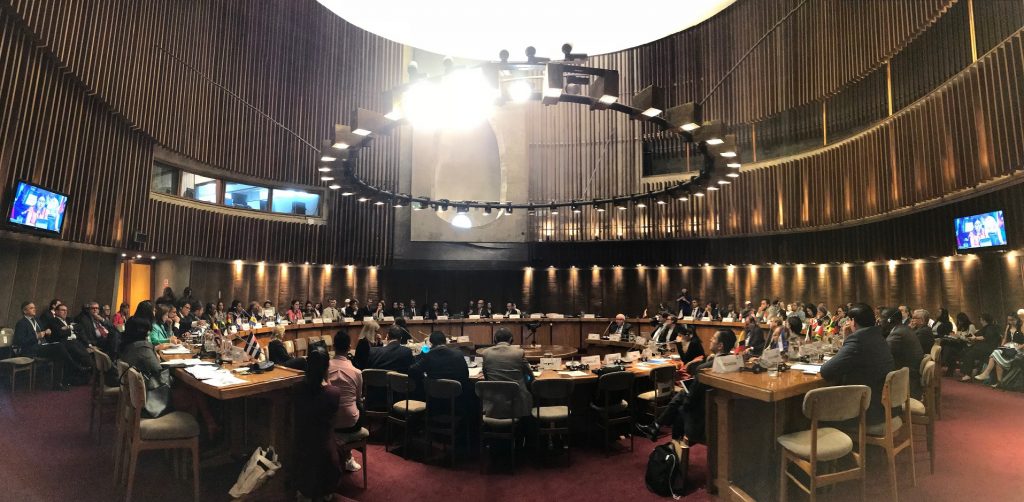
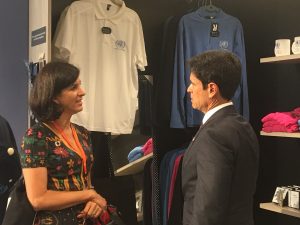 Adriana found her chance when she bumped into Enrique Villa da Costa Ferreira, National Secretary for Social Coordination of the Government Secretariat of the Office of the President of Brazil, and took the opportunity to introduce herself, present the work of libraries in Brazil, and ask to be included in the sectoral committees that work in the monitoring and implementation of the Agenda at the national level. Secretary Villa da Costa Ferreira provided guidance on how to get involved and Adriana promised to follow up.
Adriana found her chance when she bumped into Enrique Villa da Costa Ferreira, National Secretary for Social Coordination of the Government Secretariat of the Office of the President of Brazil, and took the opportunity to introduce herself, present the work of libraries in Brazil, and ask to be included in the sectoral committees that work in the monitoring and implementation of the Agenda at the national level. Secretary Villa da Costa Ferreira provided guidance on how to get involved and Adriana promised to follow up.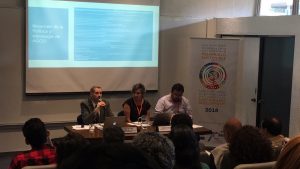
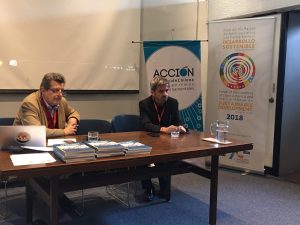
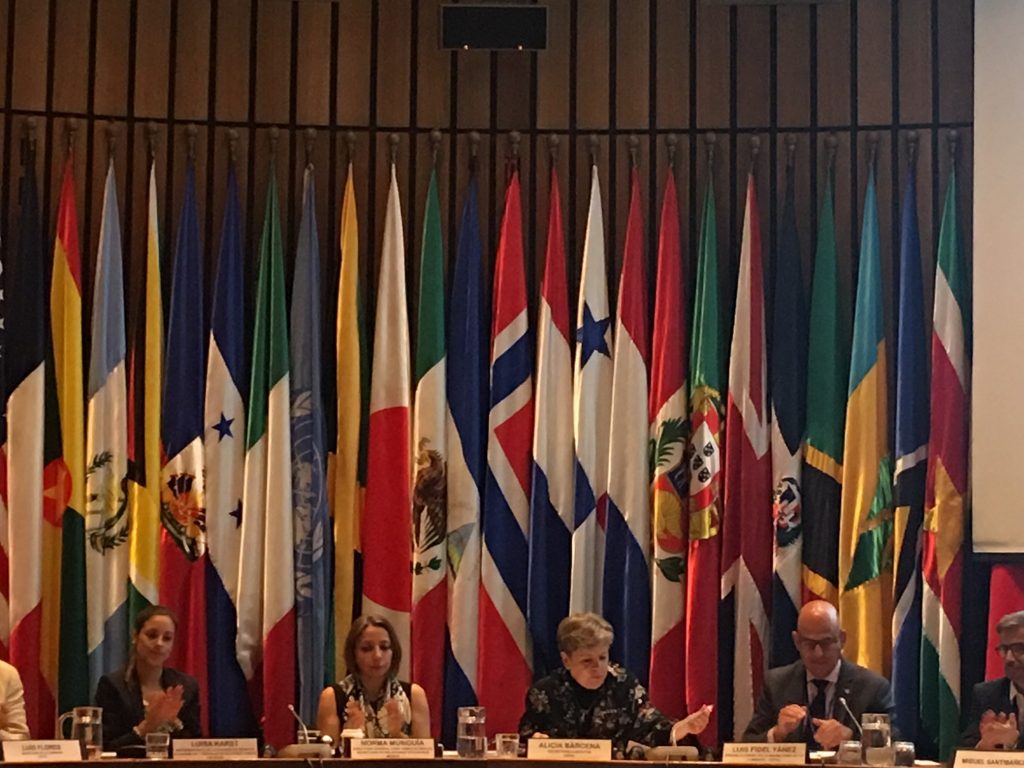
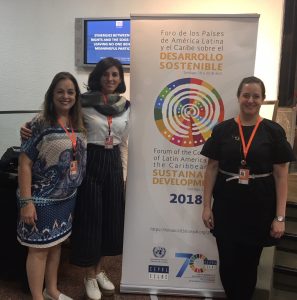 As a few highlights: as a result of networking with fellow Brazilian civil society members, Adriana was invited to be involved in the
As a few highlights: as a result of networking with fellow Brazilian civil society members, Adriana was invited to be involved in the 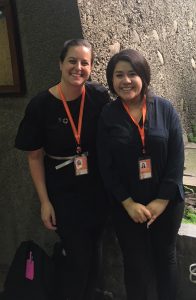
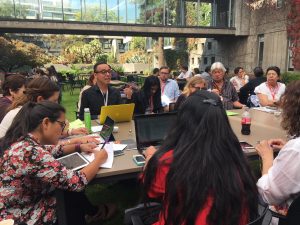

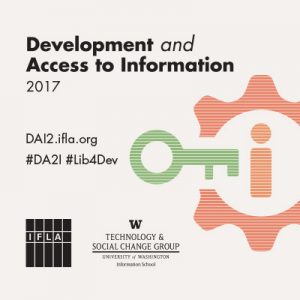 Ten years ago, Oxfam launched a successful campaign based on the proverb: ‘Give a man a fish, he will eat for a day. Teach a man to fish, and he will eat for a lifetime’.
Ten years ago, Oxfam launched a successful campaign based on the proverb: ‘Give a man a fish, he will eat for a day. Teach a man to fish, and he will eat for a lifetime’.